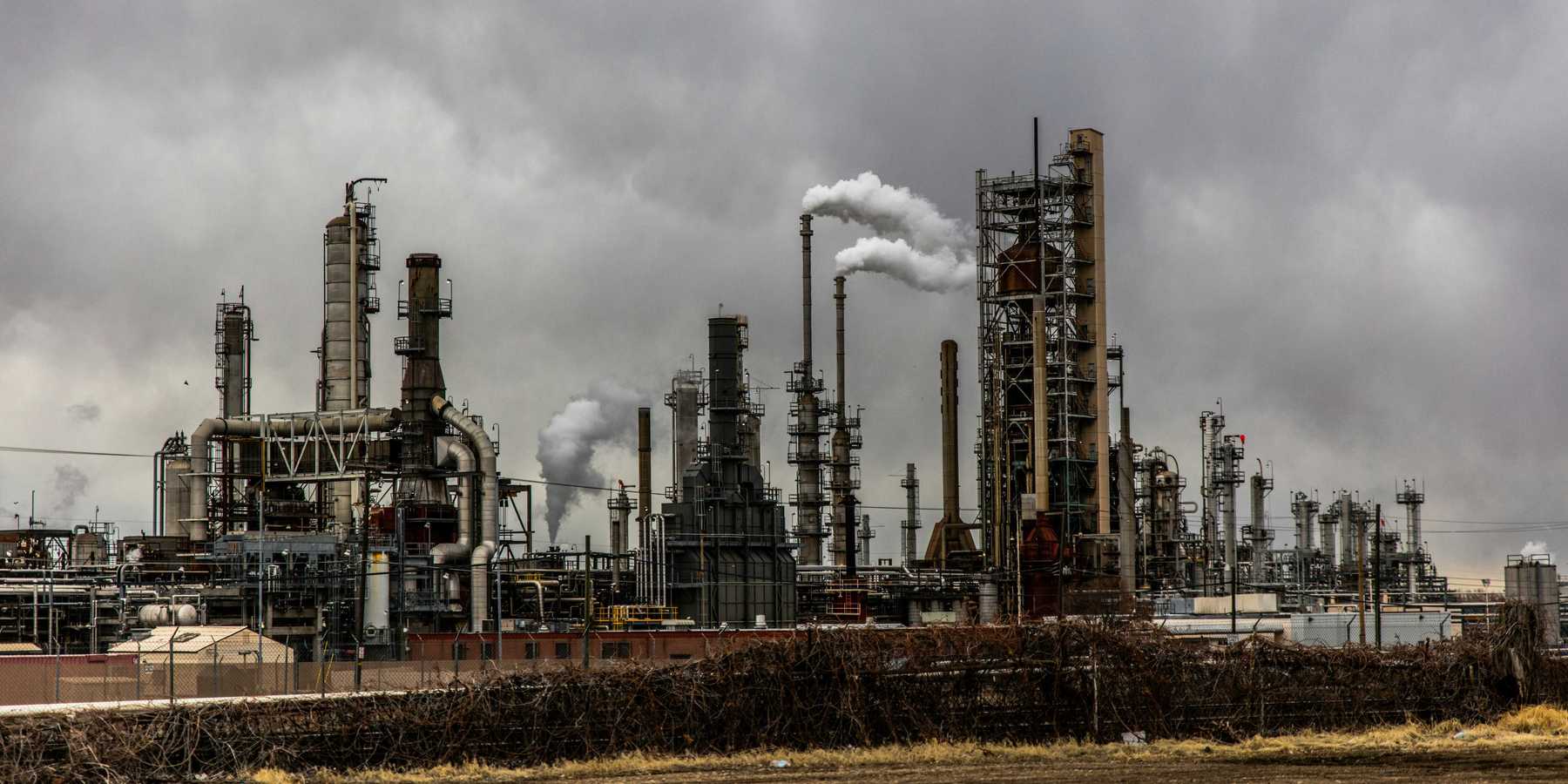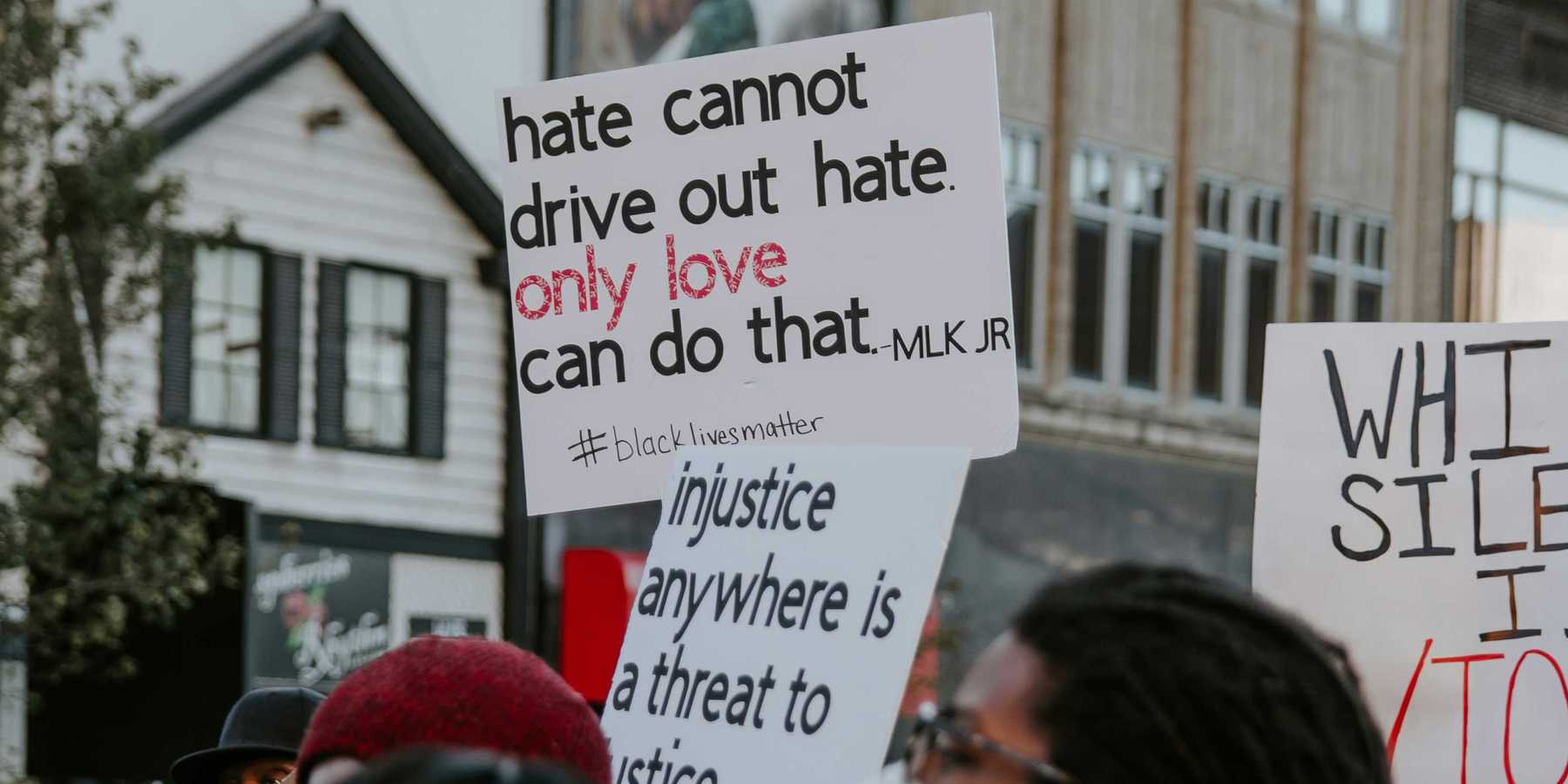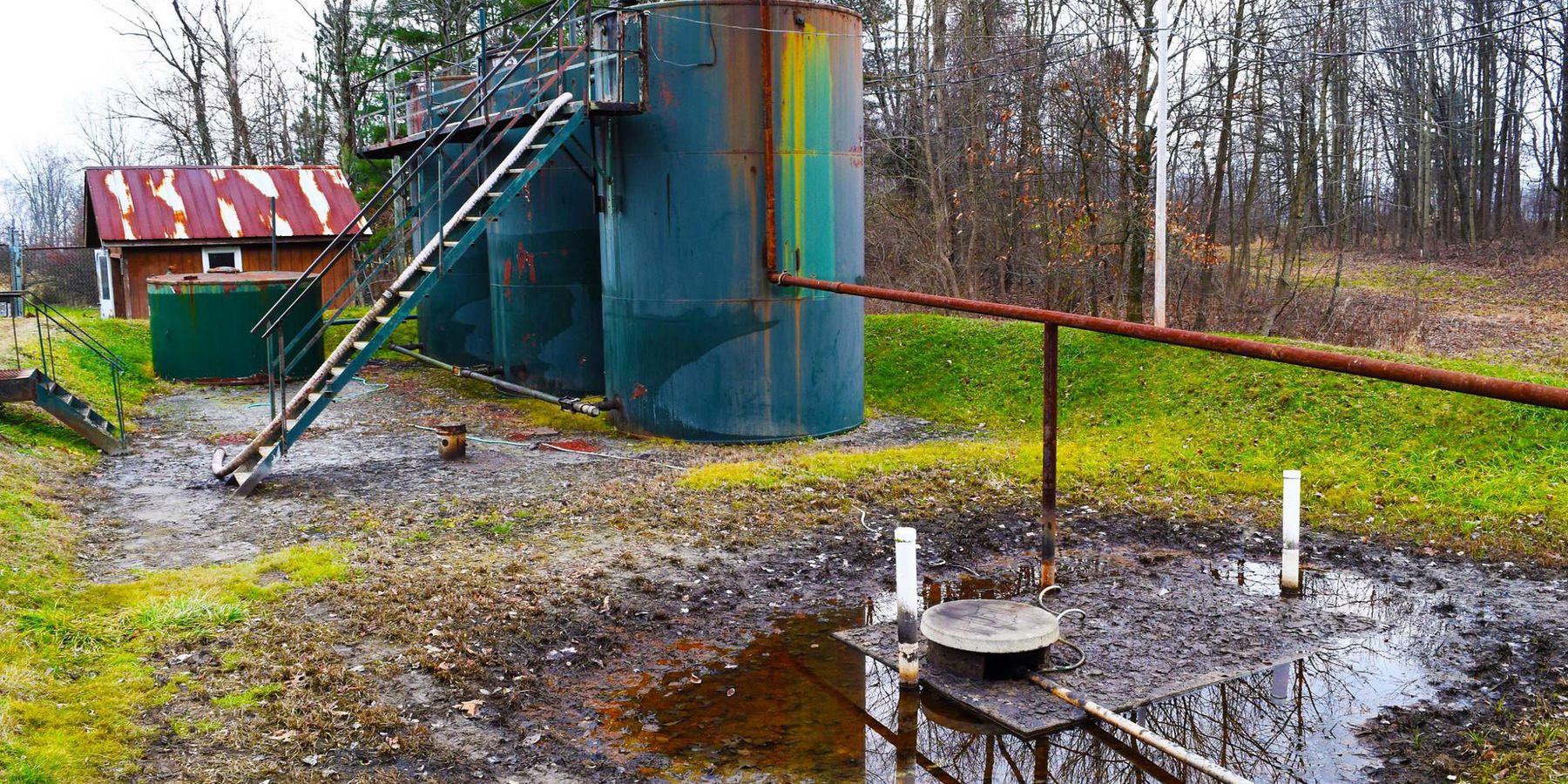
Should oil and gas companies be exempt from Pennsylvania’s hazardous waste laws?
State legislators are considering a set of bills aimed at protecting residents from exposure to cancer-causing radioactive waste from the oil and gas industry.
PITTSBURGH—In the wake of growing concerns over the oil and gas industry's handling of radioactive waste, activists and policymakers are working to change laws that exempt the industry from safety regulations.
For decades, national environmental organizations have tried unsuccessfully to close federal loopholes that exempt the oil and gas industry's radioactive waste—which has been linked to elevated cancer rates—from regulation. Industry and government reports
indicate that these exemptions persist because the cost of treating the waste as hazardous would be tremendous.
Meanwhile, other industries that generate radioactive waste—like nuclear energy, research, and pharmaceutical industries—are meticulously regulated by multiple federal agencies.
"Radioactive wastes generated by these industries are regulated differently depending on the particular sources of radiation involved and risks posed from exposure, contamination, and accident potential," Aaron Flyer, an environmental lawyer in Washington, D.C. who is a former nuclear engineer, told EHN.
Related: How joining a climate program could save Western Pennsylvania kids' lives and lungs
"The Nuclear Regulatory Commission (NRC) doesn't get involved unless you're operating under an NRC license," Flyer explained. "The oil and gas industry isn't generating radioactive materials for commercial use or disposing of [waste] regulated under the Atomic Energy Act of 1954, which would require an NRC license, even though their operations pick up naturally occurring radioactive materials—it's just incidental to their operations."
In Pennsylvania, these legislative loopholes have resulted in radioactive oil and gas waste at municipal landfills and sewage treatment plants that aren't equipped to handle it, being intentionally spread on roadways and farmland, and contaminating waterways used for drinking water, fishing, and swimming.
Now, amid growing concerns about potential cancer risk associated with that waste, community advocates and some policymakers in Pennsylvania are trying to close loopholes at the state level—while also trying to prevent neighboring states from bearing the burden as a result.
"We've blindly trusted this industry for the past decade and we're seeing worse health impacts and weakened water quality. It's time for elected officials to start protecting us," Veronica Coptis, executive director of the nonprofit Center for Coalfield Justice, told EHN.
Pennsylvania legislators have introduced three bills that would close the state's loopholes, and the Center for Coalfield Justice is collecting signatures for a petition supporting that legislation.
On September 30, Coptis testified at a Senate Democratic Policy Committee hearing on the proposed bills.
The hearing revealed that the Pennsylvania Department of Environmental Protection (DEP) doesn't routinely conduct radioactivity testing as part of its water contamination investigations, or cross-check the reports on radioactivity submitted by drilling companies and landfills accepting the waste due to staff and funding shortages. A representative from DEP's Bureau of Radiation Protection stated that the threat for human health impacts caused by spills and leaks of the oil and gas industry's radioactive waste is "real" and must be monitored, and representatives from the the Pennsylvania Department of Health (DOH) said the agency hasn't yet adequately assessed those risks.
Neither agency took a position on the proposed bills, but in its written testimony for the hearing, the Health Department wrote that, "from a purely public health standpoint, PA DOH believes that measures to prevent or reduce human contact with potential contaminants is beneficial."
Scott Perry, DEP's Deputy Secretary for Oil and Gas Management, said "DEP has not developed a position on the legislation, [but] we will not shy away from appropriately regulating this industry."
On September 30, a group of more than 65 environmental groups from across the U.S.—including many in western Pennsylvania—also published a letter urging President Joe Biden to close the federal loopholes for oil and gas waste.
Cancer concerns
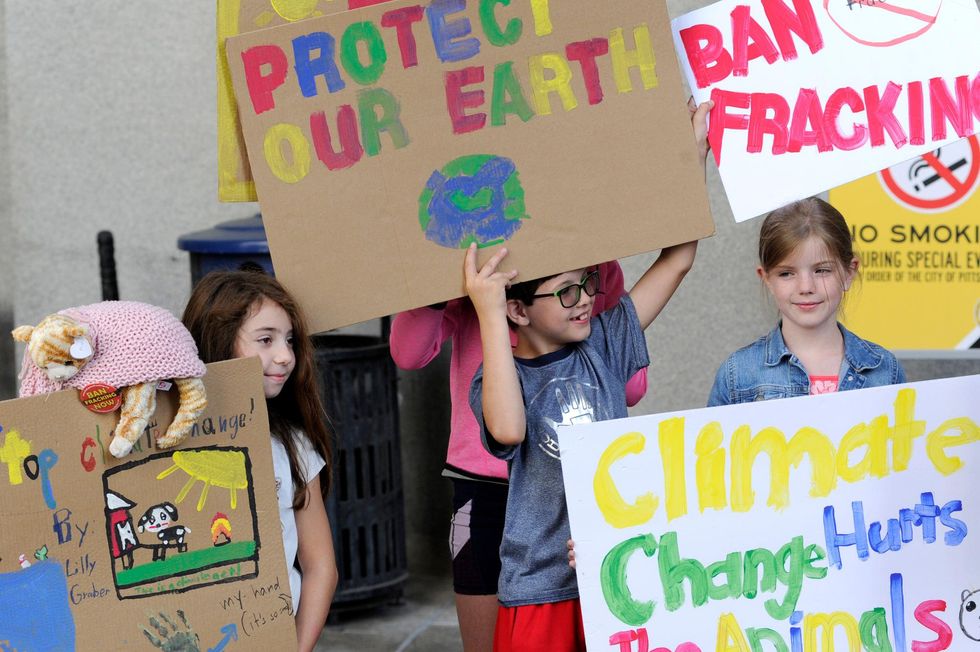
Children at youth climate change protest in downtown Pittsburgh. (Credit: Connor Mulvaney for Environmental Health News)
Western Pennsylvania has a cancer problem. The state as a whole has the third highest cancer rate of all U.S. states, and western Pennsylvania has substantially higher rates of numerous cancers linked to environmental exposures compared to state and national averages.
Allegheny County, which encompasses Pittsburgh, is in the top 2% of all U.S. counties for cancer risk from air pollution, and above-average levels of carcinogens have been found in the region's drinking water.
Families in western Pennsylvania's rural counties, where much of the state's fracking occurs, have demanded an investigation into a rash of rare childhood cancers in the region, citing concerns about fracking pollution including potential radioactivity. An EHN investigation published in March found higher than average levels of cancer-causing (non-radioactive) chemicals used in fracking in the homes and bodies of residents in the region.
Health advocates in the region are increasingly worried about how radioactive waste from the oil and gas industry could be contributing to cancer rates.
The oil and gas industry brings naturally occurring, low-level radioactive substances from deep in the Earth to the surface. These substances, which can include radium, radon, uranium, potassium, and thorium, are referred to as Technologically Enhanced Naturally Occurring Radioactive Material. Exposure to radioactive materials increases cancer risk, with risk levels increasing as levels of radioactivity increase.
Related: The "twin crises" of high cancer rates and exposure to toxics in Pittsburgh
"Naturally occurring radioactivity is all over the place," Flyer said. "The problem is when you collect it, condense it, and it becomes concentrated in sludge or other byproducts from drilling or mining operations. That's where the dose can become high."
Both conventional and unconventional oil and gas drilling create this type of radioactive waste. Hydraulic fracturing, or fracking—the process of extracting oil and gas from the Earth by drilling deep wells and injecting liquid at high pressure—can result in higher volumes because more earth is disturbed
Testing has found high levels of radioactivity in drill cuttings (rocks cut up by drilling), air emissions and fluids from fracking wells, and in the scale and sludge that builds up in pipes, hoses, water filters, storage tanks, and trucks.
These materials are often transported from well sites in trucks that aren't labeled as hazardous by workers who aren't given special protective equipment or informed about potential risks. Much of the solid waste is taken to landfills in Pennsylvania and neighboring states, which have a patchwork of differing regulations on what levels of radioactivity are permitted. Some solid waste that's highly radioactive is sent to Texas or Utah for disposal in specialized landfills for radioactive waste.
The liquid waste is injected deep underground in injection wells, sent to recycling or treatment facilities for reuse by the industry, or repurposed into commercial products like pool salts and road de-icers (in addition to containing radioactive substances and heavy metals, fracking brine is also extremely salty).
Contamination of soil and waterways has been documented from spills and leaks on well pads, trucking accidents, leaking injection wells, and road spreading. Efforts are currently underway to begin transporting fracking waste by barge, which advocates worry would pose additional risks to waterways.
Community advocates want to see more thorough testing of these materials for radioactivity while they're being stored, transported, and disposed of. They want clear labeling of these substances as hazardous, protective equipment and safety education for workers and their families, and safer disposal methods.
"It will be very hard to prove scientifically because of the small, rural nature of our communities," Coptis said, "but there's a clear correlation between where residents are sick and where oil and gas waste is being stored and transported."
Radioactive regulatory gaps
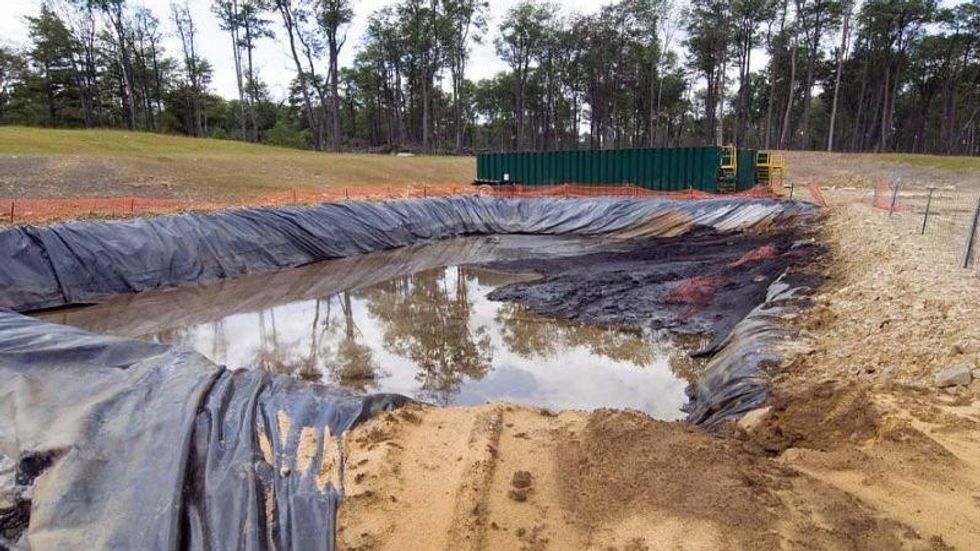
Fracking open pit waste storage in Loyalsock Township, Pennsylvania. (Credit: Barb Jarmoska, photo courtesy of FracTracker Alliance)
Radioactive waste generated for commercial use—like nuclear energy, medicine, and research—is strictly regulated through the numerous federal and state agencies, including the NRC, the U.S. Environmental Protection Agency (EPA), the Department of Transport, and the Department of Energy, among others.
The industry and the U.S. government have known about health risks associated with radioactive waste at oil and gas operations since at least the 1980s, but special exemptions or loopholes still exist in multiple federal laws including the Resource Conservation and Recovery Act, worker safety regulations enforced by the Occupational Safety and Health Administration, the Atomic Energy Act, and the Clean Water Act.
Industry and government documents published in a 2020 Rolling Stone investigation revealed that these exemptions and loopholes exist largely for political reasons—namely, due to concerns about the exorbitant cost the industry would incur if its radioactive waste was regulated as hazardous. Municipal landfills charge oil and gas companies a fraction of what they'd have to pay to send the waste to landfills that are licensed to handle low-level radioactive waste.
"If the industry had to pay the appropriate costs for getting rid of this material, it would go bankrupt," John Stolz, director of the Center for Environmental Research and Education at Duquesne University in Pittsburgh, told EHN.
States can enact more stringent regulations for hazardous waste, but a July report by the Natural Resources Defense Council (NRDC), an environmental advocacy group, looked at how radioactive waste from the oil and gas industry is regulated by states and concluded "state regulations are inadequate to protect human health and the environment."
That report laid out the loopholes and exemptions that exist in various federal laws and what it would take to close them, and also looked at the laws in 12 states with a fracking industry presence: Alaska, California, Colorado, Louisiana, New Mexico, North Dakota, Ohio, Oklahoma, Pennsylvania, Texas, West Virginia, and Wyoming. It found:
- All 12 states allow oil and gas waste disposal in municipal and sanitary landfills, and only eight put limits on radioactivity in that waste;
- Eight states allow oil and gas wastewater discharges to surface waters like rivers and streams, and only four put limits on radioactivity;
- Nine states allow wastewater in some form of land application like farming, irrigation, spraying, and road building, and only three have radioactive materials standards for those practices;
- All 12 states allow oil and gas waste burial on well pads, and only one puts limits on radioactivity;
- 10 states allow oil and gas wastewater spreading on roads for dust suppression or de-icing, and only three put limits on radioactivity.
In Pennsylvania, the report found:
- Raw or treated fracking wastewater can be discharged to surface waters with a National Pollutant Discharge Elimination System permit with no standards for radioactivity;
- Untreated wastewater from conventional oil and gas wells is spread on roads for dust suppression and de-icing with no standards for radioactivity;
- With a permit, wastewater containing radioactive waste can be buried on well pads or in injection wells with no standards for radioactivity;
- Wastewater from fracking or conventional wells can be used for irrigation or farming with no standards for radioactivity;
- Municipal landfills can accept drilling waste with approval from the DEP and facility-specific limits on radioactivity.
Pennsylvania stopped spreading fracking wastewater on roadways in 2018 due to concerns about radioactivity, but has continued the practice with wastewater from conventional wells. Stolz has analyzed wastewater from both fracking and conventional wells, and said there's little difference in their makeup when it comes to chemicals of concern for human health and levels of radioactivity.
The NRDC report also summarized scientific studies that found high levels of radioactive material linked to oil and gas waste in numerous Pennsylvania waterways, including those used for fishing, swimming, and drinking water. Most of these incidents occurred in southwestern Pennsylvania.
One well-known example occurred in 2011, when a municipal sewage treatment plant accepting drilling waste discharged radioactive radium into the Monongahela River—which provides drinking water for hundreds of thousands of people—at levels higher than allowable by law. The same year, fracking companies were asked by the DEP to voluntarily stop sending liquid waste to municipal treatment plants in Pennsylvania. In 2016, a federal ban on the practice was enacted.
Closing oil and gas loopholes
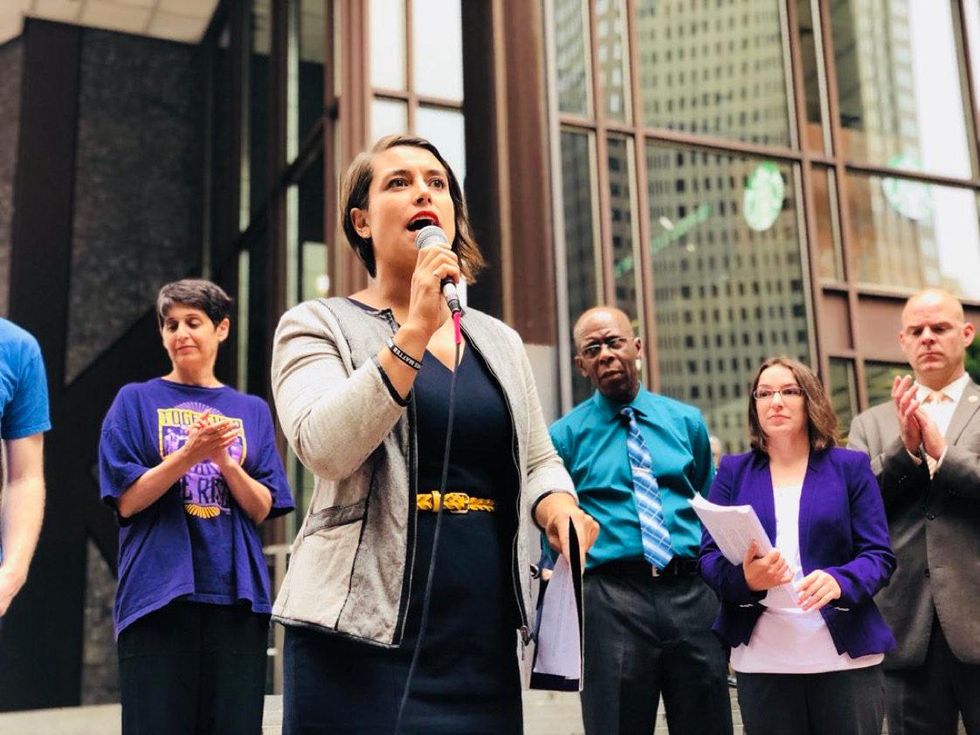
Pennsylvania State Rep. Sara Innamorato (D-Allegheny County) , pictured here, and Senator Katie Muth (D-Montgomery County) introduced three bills that would close the loopholes exempting the oil and gas industry from the state's hazardous waste regulations. (Credit: https://www.saraforpa.com/)
Coptis said people are often shocked to learn that radioactive waste from the oil and gas industry isn't effectively regulated.
"There's an assumption that hazardous waste has to be tested before it can be dumped in a river or a landfill in your neighborhood," she said.
A July poll by the Ohio River Valley Institute, a nonprofit think tank, showed that 69% of Pennsylvania voters believe that fracking fluids should be subject to the state's hazardous waste regulations, and 82% support requiring safer transport of hazardous waste from fracking sites.
Last year, New York passed laws that closed its state-level oil and gas waste loopholes. New York banned fracking in 2015, but seven landfills across the state accepted more than 600,000 tons of solid and liquid waste from fracked wells in Pennsylvania between 2011 and 2020, none of which was subject to the state's existing hazardous waste regulations before the loophole was closed.
Pennsylvania State Rep. Sara Innamorato (D-Allegheny County) and Senator Katie Muth (D-Montgomery County) introduced three bills that would close the loopholes exempting the oil and gas industry from the state's hazardous waste regulations by defining drilling waste as hazardous under the PA Solid Waste Management Act. The bills would repeal language in the Act that exempts the industry from testing or treating drilling wastewater before disposal, and subject oil and gas waste to testing before it is accepted in or released from municipal and sanitary landfills.
"Right now, under the supervision of both the DEP and EPA, billions of gallons of radioactive frack waste is being discharged each year into waterways of our Commonwealth," Muth said in a statement.
The bills have been referred to the Pennsylvania House Environmental Resources and Energy Committee.
In July, PA Governor Tom Wolf's administration announced that it will require Pennsylvania landfills to conduct quarterly testing of leachate—the liquid that seeps out of landfills as a result of waste decomposition—for radioactive contaminants.
Muth, Innamorato, and Coptis said that's a good first step, but doesn't go far enough.
"If leachate does test positive for radioactivity and is indeed hazardous, right now the burden for dealing with that problem is being put on facilities that aren't equipped, designed, or funded to do that," Coptis said. "Essentially it's a private industry putting the burden of disposing of its hazardous waste onto taxpayers."
Stolz echoed those concerns.
"I can't even send batteries or an old smoke detector to my municipal landfill because it has a radioactive element in it," he said, "but the oil and gas industry gets a free pass."
Contamination crossing state lines
One concern about closing the loopholes in Pennsylvania is that the industry's waste could be sent across state lines to Ohio or West Virginia where regulations are looser.
"When drilling waste comes into Ohio from Pennsylvania, we can at least tell from the PA DEP website what's coming in," Leatra Harper, managing director of the Ohio FreshWater Accountability Project, told EHN. "Once it gets to Ohio it's basically unregulated."
Alex Cole, a community organizer with the Ohio Valley Environmental Coalition, said similar concerns exist in West Virginia.
"I grew up on the Kanawha River that runs through Charleston [West Virginia], which has been a chemical valley since the 1950s," he told EHN. "It's the longest river in West Virginia and it's so contaminated that no one can get drinking water from it… With all the [fracking] industry waste that's winding up in the Ohio River, which provides drinking water to more than 5 million people, I can definitely foresee a time when it could also become undrinkable."
Coptis said her organization is working across state lines to collaborate with advocates trying to close oil and gas waste loopholes in surrounding states. She noted that if Pennsylvania closes the loopholes and the waste goes across state lines, Pennsylvania residents would still be at risk for exposure.
"I live in Pennsylvania but I live downstream of West Virginia, which is where my water comes from," she said. "It has to be a state by state fight, but our neighbors in Ohio and West Virginia deserve the same protections we do."
Banner photo: An injection well site in Holmes County, Ohio. (Credit: Ted Auch, FracTracker Alliance, 2015.)



